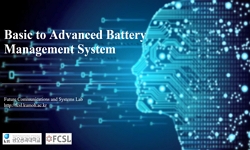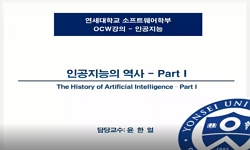As artificial intelligence outperforms humans in some cognitive tasks which have been regarded as properly belonging to the human being, there is growing anxiety that people experience. Now, many people attempt to place the uniqueness of the humans in...
http://chineseinput.net/에서 pinyin(병음)방식으로 중국어를 변환할 수 있습니다.
변환된 중국어를 복사하여 사용하시면 됩니다.
- 中文 을 입력하시려면 zhongwen을 입력하시고 space를누르시면됩니다.
- 北京 을 입력하시려면 beijing을 입력하시고 space를 누르시면 됩니다.

인공 지능에서 인공 감정으로‒감정을 가진 기계는 실현가능한가?‒ = Artificial intelligence and artificial emotions - Is an emotion robot realizable? -
한글로보기부가정보
다국어 초록 (Multilingual Abstract)
As artificial intelligence outperforms humans in some cognitive tasks which have been regarded as properly belonging to the human being, there is growing anxiety that people experience. Now, many people attempt to place the uniqueness of the humans in emotion rather than reason or intelligence. Since artificial emotions and emotional robots are emerging as new topics in artificial intelligence and robotics, however, philosophical treatment of them is required. I begin with discussing what has motivated to develop emotional robots and why emotions matter in robotics.
After reviewing the current status of emotional robots, I examine whether the emotion-possessing robots are possible. The possibility of artificial emotions depends on what emotions really are. Instead of stipulating the definition of emotions, I suggest criteria on which we can assign emotions to other people, animal, or alien objects including artificial agents by considering the key roles played by emotions in intelligent beings. On these criteria, I argue, it is unlikely for genuinely emotional robots to be realized in the near future. Still, even if emotional robots would not appear shortly, unidirectional emotional bonds with social robots equipped with some degree of autonomy are potentially detrimental, which ought to be seriously considered in an ethical discussion of robots.
국문 초록 (Abstract)
인공 감정에 관한 철학적 탐구가 필요한 시점이다. 인간의 고유한 영역으로 간주되던 인지적 과제에서 기계의 추월을 염려하는 처지가 되자, 사람들은 이제 이성이 아니라 감정에서 인간의 ...
인공 감정에 관한 철학적 탐구가 필요한 시점이다. 인간의 고유한 영역으로 간주되던 인지적 과제에서 기계의 추월을 염려하는 처지가 되자, 사람들은 이제 이성이 아니라 감정에서 인간의 고유성을 찾으려한다. 하지만 최근인공지능 로봇에 감성을 불어넣는 작업이 새로운 화두로 떠오르고 있다. 이 글은 인공 감정의 실현가능성과 잠재적인 위험을 논의한다. 먼저, 감성 로봇의 개발 현황과 주요한 동기들을 개괄하고, 왜 로봇의 감정이 문제가 되는지 살펴본다. 진정한 감정-소유 로봇이 가능한지 검토하기 위해 감정을 선험적으로 정의하기보다는 감정이 수행하는 몇 가지 핵심 역할을 소개하고 이로부터 어떤 대상에 감정을 부여할 수 있는 기준들을 제안한다. 나는 이런 기준에 비추어 진정한 감정 로봇이 근미래에 실현될 가능성이 낮다고 주장한다. 그러나 감정-소유로봇이 등장하기 이전이라도, 어느 정도의 자율성을 가진 로봇과 맺는 일방적감정 소통은 잠재적으로 위험할 수 있으며, 이에 대비하는 것이 시급하다고 주장한다.
참고문헌 (Reference)
1 김평수, "인간과 교감하는 감성로봇 관련 기술 및 개발 동향" 33 (33): 19-27, 2016
2 고인석, "아시모프의 로봇 3법칙 다시 보기: 윤리적인 로봇 만들기" 철학연구회 (93) : 97-120, 2011
3 이원형, "사람과 로봇의 사회적 상호작용을 위한 로봇의 가치효용성 기반 동기-감정 생성 모델" 제어·로봇·시스템학회 20 (20): 503-512, 2014
4 이찬종, "로봇의 감정인식" 한국로봇학회 6 (6): 16-19, 2009
5 박천수, "로봇과 감성" 26 (26): 63-69, 2008
6 빌라야누르 라마찬드란, "뇌는 어떻게 세상을 보는가" 바다출판사 2016
7 랭던 위너, "길을 묻는 테크놀로지" 씨·아이·알 2010
8 천현득, "감정은 자연종인가? -감정의 자연종 지위 논쟁과 감정 제거주의-" 철학사상연구소 (27) : 317-346, 2008
9 안호석, "감정 기반 로봇의 연구 동향" 13 (13): 19-27, 2007
10 이동욱, "감성교감형 로봇 연구동향" 26 (26): 65-72, 2008
1 김평수, "인간과 교감하는 감성로봇 관련 기술 및 개발 동향" 33 (33): 19-27, 2016
2 고인석, "아시모프의 로봇 3법칙 다시 보기: 윤리적인 로봇 만들기" 철학연구회 (93) : 97-120, 2011
3 이원형, "사람과 로봇의 사회적 상호작용을 위한 로봇의 가치효용성 기반 동기-감정 생성 모델" 제어·로봇·시스템학회 20 (20): 503-512, 2014
4 이찬종, "로봇의 감정인식" 한국로봇학회 6 (6): 16-19, 2009
5 박천수, "로봇과 감성" 26 (26): 63-69, 2008
6 빌라야누르 라마찬드란, "뇌는 어떻게 세상을 보는가" 바다출판사 2016
7 랭던 위너, "길을 묻는 테크놀로지" 씨·아이·알 2010
8 천현득, "감정은 자연종인가? -감정의 자연종 지위 논쟁과 감정 제거주의-" 철학사상연구소 (27) : 317-346, 2008
9 안호석, "감정 기반 로봇의 연구 동향" 13 (13): 19-27, 2007
10 이동욱, "감성교감형 로봇 연구동향" 26 (26): 65-72, 2008
11 Fellous, Jean-Marc, "Who Needs Emotions?: The Brain Meets the Robot" Oxford University Press 2005
12 Searle, John R., "The rediscovery of the mind, Representation and mind" MIT Press 1992
13 Minsky, Marvin., "The Society of Mind" Simon and Schuster 1986
14 Bijker, Wiebe E., "The Social Construction of Technological Systems: New Directions in the Sociology and History of Technology" MIT Press 1987
15 Pinch, Trevor, "The Social Construction of Facts and Artifacts: Or How the Sociology of Science and the Sociology of Technology Might Benefit Each Other" 1987
16 Kurzweil, Ray., "The Singularity is Near: When Humans Transcend Biology" Viking 2005
17 Boden, Margaret A., "The Philosophy of Artificial Intelligence" Oxford University Press 1990
18 Kaku, Michio, "The Future of the Mind: the Scientific Quest to Understand, Enhance, and Empower the Mind" Doubleday 2014
19 Kuhn, Thomas S., "The Copernican Revolution: Planetary Astronomy in the Development of Western Thought" Harvard University Press 1957
20 Frankish, Keith, "The Cambridge Handbook of Artificial Intelligence" Cambridge University Press 2014
21 Bostrom, Nick., "Superintelligence: Paths, Dangers, Strategies" Oxford University Press 2014
22 Hindi Attar, Catherine, "Selective Attention to Task-Irrelevant Emotional Distractors Is Unaffected by the Perceptual Load Associated with a Foreground Task" 7 (7): e37186-, 2012
23 Breazeal, Cynthia, "Robot emotion: A functional perspective"
24 Pessoa, Luiz, "Neuroimaging studies of attention and the processing of emotion-laden stimuli" 144 : 171-182, 2004
25 McCarthy, John., "Making Robots Conscious of Their Mental States" 15 : 1995
26 Waytz, Adam, "How to Make Robots Seem Less Creepy"
27 Noble, David F., "Forces of Production: A Social History of Industrial Automation" Oxford University Press 1984
28 Scheutz, Matthias, "First steps toward natural human-like HRI" 22 (22): 411-423, 2007
29 Megill, Jason, "Emotion, Cognition and Artificial Intelligence" 24 : 189-199, 2014
30 Damasio, Antonio R., "Descartes' Error: Emotion, Reason, and the Human Brain" Putnam 1994
31 Russell, Stuart J., "Artificial Intelligence: a Modern Approach" Prentice Hall 2010
32 Turkle, Sherry., "Alone Together: Why we expect more from technology and less from each other" Basic Books 2011
동일학술지(권/호) 다른 논문
-
- 한국철학회
- 정우진(Woojin Jung)
- 2017
- KCI등재
-
- 한국철학회
- 한석환(Seokwhan Hahn)
- 2017
- KCI등재
-
- 한국철학회
- 주동률(Dong-Ryul Choo)
- 2017
- KCI등재
-
- 한국철학회
- 설민(Min Seol)
- 2017
- KCI등재
분석정보
인용정보 인용지수 설명보기
학술지 이력
| 연월일 | 이력구분 | 이력상세 | 등재구분 |
|---|---|---|---|
| 2023 | 평가예정 | 계속평가 신청대상 (기타) | |
| 2018-01-01 | 평가 | 우수등재학술지 선정 (계속평가) | |
| 2015-01-01 | 평가 | 등재학술지 유지 (등재유지) |  |
| 2013-12-02 | 학술지명변경 | 외국어명 : PHILPSOPHY -> CHEOLHAK: Korean Journal of Philosophy |  |
| 2013-01-01 | 평가 | 등재학술지 유지 (등재유지) |  |
| 2010-01-01 | 평가 | 등재학술지 유지 (등재유지) |  |
| 2008-01-01 | 평가 | 등재학술지 유지 (등재유지) |  |
| 2006-01-01 | 평가 | 등재학술지 유지 (등재유지) |  |
| 2005-10-06 | 학술지등록 | 한글명 : 철학외국어명 : PHILPSOPHY |  |
| 2004-01-01 | 평가 | 등재학술지 유지 (등재유지) |  |
| 2001-07-01 | 평가 | 등재학술지 선정 (등재후보2차) |  |
| 1999-01-01 | 평가 | 등재후보학술지 선정 (신규평가) |  |
학술지 인용정보
| 기준연도 | WOS-KCI 통합IF(2년) | KCIF(2년) | KCIF(3년) |
|---|---|---|---|
| 2016 | 0.41 | 0.41 | 0.48 |
| KCIF(4년) | KCIF(5년) | 중심성지수(3년) | 즉시성지수 |
| 0.41 | 0.4 | 1.181 | 0.16 |





 KCI
KCI







